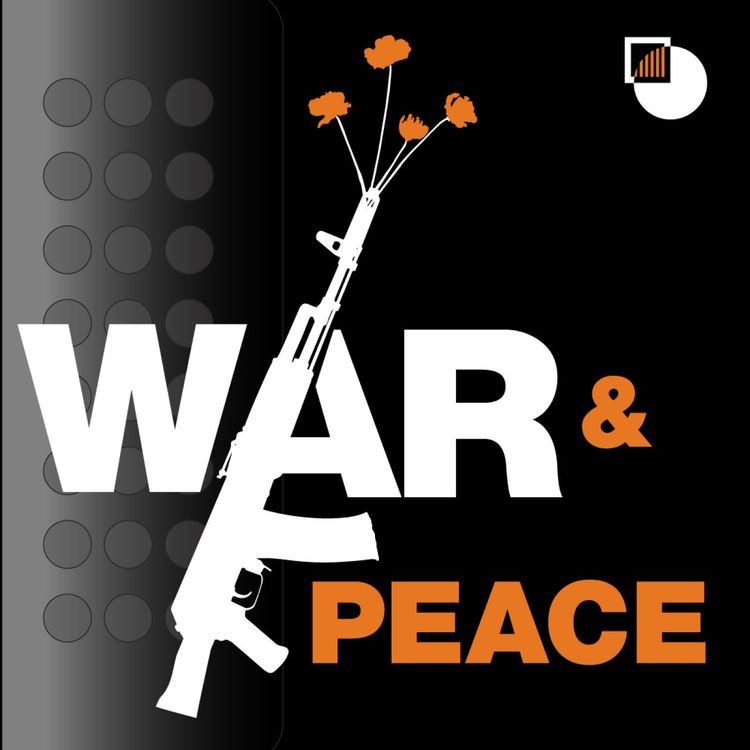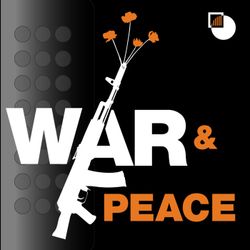Share

War & Peace
Bert Koenders on the War in Ukraine and the Future of Europe
Russia’s full-scale invasion of Ukraine has marked a watershed for Europe. The European Union (EU) and its member states acted quickly to implement sanctions against Russia, bolster Ukrainian defences and improve their own energy security. Now, over a year later, with no end in sight to the fighting, EU members and their allies and partners are faced with new challenges as they strive to ensure their policies are sustainable and start thinking about how best to define and ensure their security into the future.
This week on War & Peace, Olga Oliker and Elissa Jobson talk with Bert Koenders, former Dutch minister of foreign affairs and current Crisis Group trustee, about how the war in Ukraine has changed Europe, how the EU has faced the challenges created by the war and the future of Europe’s security architecture. They take stock of the EU’s response to Russian aggression in Ukraine and discuss European solidarity in support of Ukraine among its member states. They also evaluate how the EU might need to adapt its policies and internal structure to better address not just continuing war in Ukraine, but also future crises. Finally, they touch on how Europe’s security architecture might change, prospects for European strategic autonomy and, relatedly, whether the U.S. will remain a reliable partner.
For more on the topics discussed in this episode, make sure to check out our Ukraine page and our EU Watch List.
More episodes
View all episodes

5. Can Europe Solve Its U.S. Dilemma?
42:30||Season 7, Ep. 5In this episode of War & Peace, Olga and Alissa are joined by Nathalie Tocci, director of the Istituto Affari Internazionali in Rome, to discuss how European capitals are reacting to recent U.S. actions in Venezuela and the Trump administration’s aggressive rhetoric over Greenland, and how EU and NATO member states can navigate an increasingly strained transatlantic relationship. They explore how European governments may rethink security in order to reduce dependence on the U.S. as Washington increasingly disregards international norms and even threatens the territorial integrity of an ally. Finally, they consider how regional states can meaningfully approach multilateralism as the global order continues to shift rapidly.This episode was made possible through extra-budgetary funding from the OSCE. The views expressed do not necessarily reflect those of the OSCE.
4. Karabakh Refugees in Armenia
28:09||Season 7, Ep. 4In this episode of War & Peace, Olga Oliker and Alissa de Carbonnel are joined by Joshua Kucera, Crisis Group’s Senior Analyst for the South Caucasus, to discuss the increasingly difficult situation facing people displaced from Nagorno-Karabakh in Armenia after Azerbaijan regained control of the territory in a rapid 2023 offensive. They unpack the refugees’ mounting challenges–from insecure housing after cuts to government assistance to discrimination–and their growing frustration with Armenia’s government. They also examine the role refugees from Karabakh might play in Armenia’s 2026 elections and peace efforts with Azerbaijan, their hopes of return, and what the EU can do to help Yerevan respond.For more, check out our Armenian-Azerbaijani Conflict and Europe & Central Asia pages.
3. How Ukraine’s Women Are Meeting the Challenges of War
34:15||Season 7, Ep. 3In this episode of War & Peace, Elissa and guest host Alissa de Carbonnel are joined by Sabine Freizer Gunes, UN Women representative for Ukraine, about how the war in Ukraine has shaped and amplified gender inequalities in Ukraine and how women and women’s organisations are responding. They discuss the mood in Ukraine as it enters its fourth winter of full-scale war and the toll the conflict is taking on women from higher rates of sexual and gender-based violence, mounting mental health pressures and economic insecurity. They explore how women are navigating both the challenges and opportunities the war has created, how the Ukrainian government is addressing these issues, and how women’s organisations are affected by aid cuts. As Crisis Group marks its 30th anniversary, they also discuss how women’s roles in politics and peacemaking in Ukraine and beyond are evolving amid a global pushback against gender equality and women’s rights.For more, check out our Gender and Conflict and Ukraine pages.
2. A Bigger Table? The Case for More Global Diplomacy over Ukraine
34:17||Season 7, Ep. 2In this episode of War & Peace, Olga and guest host Alissa de Carbonnel are joined by Bob Deen, Head of the Security Unit at the Clingendael Institute, to assess the state of diplomacy aimed at ending the war in Ukraine. They discuss why peace efforts by the U.S. and others have struggled to gain traction, and what diplomacy can realistically achieve in the near term. They also look at Kyiv’s attempts to build broader global support for a peace initiative and which countries are best positioned to play a constructive role. They also consider the roles that international organisations such as the OSCE and UN might play in shaping a settlement in Ukraine and how these institutions could fit into a future European security order.Note: This episode was recorded before President Trump’s call with President Putin last week, their announcement of a planned summit in Budapest, and Trump’s White House meeting with President Zelenskyy.This episode was made possible through extra-budgetary funding from the OSCE. The views expressed do not necessarily reflect those of the OSCE.For more, check out our Ukraine and Europe & Central Asia pages.
1. Elliptical Orbit? Belarusian Foreign Policy in Fraught Times
32:32||Season 7, Ep. 1In this episode of War & Peace, Olga and Elissa speak with Valery Kavaleuski, former Belarusian diplomat and Executive Director of the Euro-Atlantic Affairs Agency, about Minsk’s evolving foreign policy and how it is constrained by enduring Russian influence. They discuss the joint Russian-Belarusian military exercise Zapad 2025, which took place just after 19 Russian drones crossed into Poland, heightening tensions between NATO and Moscow. They unpack Belarus’ continued participation in the Vienna Document, its recent engagement with Washington, which seems to have led to prisoner releases in exchange for sanctions relief, and whether the EU and its members should adopt a more pragmatic approach when engaging with Minsk. They also look at the future of Belarus’ domestic politics, the prospects for dialogue between the opposition and the Lukashenka government, and what a post-Lukashenka Belarus might look like.For more, check out our Belarus and Europe & Central Asia pages.
12. Down, But Not Out? Russia’s Shifting Role in a Turbulent Middle East
36:18||Season 6, Ep. 12In this episode of War & Peace, Olga Oliker speaks with Hanna Notte, Director for Eurasia at the James Martin Center for Nonproliferation Studies and a non-resident Senior Associate at CSIS, about Russia’s changing role in the Middle East. They discuss how Moscow is responding to the fall of Assad in Syria and the twelve-day war between Israel (and the U.S.) and Iran. They explore how Russia’s relationships with regional capitals are evolving, what Middle Eastern states hope to gain from partnership with Moscow and the prospects for U.S.-Russia cooperation in the region. For more, check out our Middle East and Europe & Central Asia page.
11. More Europe, Less U.S.? What to Expect from the NATO Summit
28:12||Season 6, Ep. 11In this episode of War & Peace, Olga and Elissa speak with Dr. Pia Fuhrhop, head of the International Security Research Division at SWP, about the upcoming NATO summit, transatlantic relations, and how European NATO allies are working to strengthen their own defence. They discuss expectations for the summit, the potential role of Ukraine, and the alliance’s push to raise defence spending targets to 5% of GDP amid growing U.S. pressure for more burden-sharing. They look at Germany’s evolving role in European security and the new government’s ambition to build “the strongest conventional army in Europe”. Finally, they consider the value of holding regular summits at a time when transatlantic relations are increasingly volatile.For more, check out our report Ukraine and Beyond: Shaping Europe’s Security Future and our Europe & Central Asia page.
10. Ukraine: The Battlefield and the Negotiating Table
24:18||Season 6, Ep. 10In this episode of War & Peace, Olga and Elissa speak with Crisis Group’s senior Ukraine analyst, Lucian Kim, about how the war in Ukraine is evolving and what is happening with diplomatic efforts to end it. They discuss recent developments along Ukraine’s front lines, how Kyiv is adapting on the battlefield and the mood among Ukrainians. They assess the recent Istanbul talks between Russian and Ukrainian delegations and the prospects for follow-on negotiations. They discuss U.S. President Donald Trump’s involvement and the takeaways from his recent phone call with Russian President Vladimir Putin. They also explore the prospect of a U.S. withdrawal of support for Ukraine and the possible responses of European leaders to fill the gap.For more, check out our Ukraine country page.
9. The Authoritarian Playbook Explained
36:40||Season 6, Ep. 9In this episode of War & Peace, Olga and Elissa talk with political scientist Ekaterina Schulmann to unpack how aspiring authoritarian leaders transform democracies into autocratic governments and whether democratic erosion in Western democracies is, in fact, a trend. They discuss how such leaders concentrate power and systematically weaken democratic institutions. They also explore the role of ideology in authoritarian systems and how these regimes differ from totalitarian forms of governance. Finally, they delve into how democratic resilience can be fostered and what can be done to reverse democratic backsliding.For more, check out our Europe and Central Asia regional page.